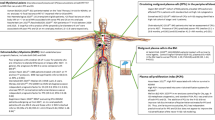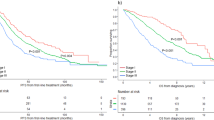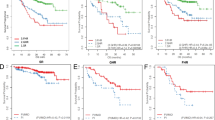Summary:
Genetic aberrations have emerged as major prognostic factors for patients with multiple myeloma (MM). We evaluated 126 MM patients for t(4;14) or t(11;14), 13q or p53 deletions and correlated the number of genetic aberrations with patient's clinical outcome following undergoing autologous stem cell transplantation. We demonstrate the significance of genetic-based risk classification that clearly segregate patients into low (no genetic abnormalities or only t(11;14)), intermediate (any one of the genetic abnormalities other than t(11;14)) and high-risk groups (any two or more of the genetic abnormalities other than t(11;14)). High-risk patients do not benefit from stem cell transplant and should be offered alternative therapies.
This is a preview of subscription content, access via your institution
Access options
Subscribe to this journal
Receive 12 print issues and online access
$259.00 per year
only $21.58 per issue
Buy this article
- Purchase on Springer Link
- Instant access to full article PDF
Prices may be subject to local taxes which are calculated during checkout


Similar content being viewed by others
References
Avet-Loiseau H, Brigaudeau C, Morineau N et al. High incidence of cryptic translocations involving the Ig heavy chain gene in multiple myeloma, as shown by fluorescence in situ hybridization. Genes Chromosomes Cancer 1999; 24: 9–15.
Bergsagel PL, Kuehl WM . Chromosome translocations in multiple myeloma. Oncogene 2002; 20: 5611–5622.
Moreau P, Facon T, Leleu X et al. Recurrent 14q32 translocations determine the prognosis of multiple myeloma, especially in patients receiving intensive chemotherapy. Blood 2002; 100: 1579–1583.
Chang H, Sloan S, Li D et al. The t(4;14) is associated with poor prognosis in myeloma patients undergoing autologous stem cell transplant. Br J Haematol 2004; 125: 64–68.
Chang H, Qi XY, Yi QL et al. P53 gene deletion detected by fluorescence in situ hybridization is an adverse prognostic factor for patients with multiple myeloma following autologous stem cell transplantation. Blood 2005; 105: 358–360.
Chang H, Li D, Zhuang L et al. Detection of chromosome 13q deletions and IgH translocations in patients with multiple myeloma by FISH: comparison with karyotype analysis. Leuk Lymphoma 2004; 45: 965–969.
Attal M, Harousseau JL, Stoppa AM et al. A prospective, randomized trail of autologous bone marrow transplantation and chemotherapy in multiple myeloma. Intergroupe Francais du Myeloma. N Engl J Med 1996; 335: 91–97.
Child JA, Morgan GJ, Davies FE et al. Medical research council adult leukaemia working party. High-dose chemotherapy and hematopoietic stem-cell rescue for multiple myeloma. N Engl J Med 2003; 348: 1875–1883.
Barlogie B, Shaughnessy J, Tricot G et al. Treatment of multiple myeloma. Blood 2004; 103: 20–32.
Avet-Loiseau H, Facon T, Grobois B et al. Oncogenesis of multiple myeloma: 14q32 and 13q chromosomal abnormalities are not randomly distributed, but correlate with natural history, immunological features, and clinical presentation. Blood 2002; 99: 2185–2191.
Fonseca R, Oken MM, Greipp PR, Eastern Cooperative Oncology Group Myeloma Group. The t(4;14)(p16.3;q32) is strongly associated with chromosome 13 abnormalities in both multiple myeloma and monoclonal gammopathy of undetermined significance. Blood 2002; 98: 1271–1272.
Fonseca R, Blood E, Rue M et al. Clinical biologic implications of recurrent genomic aberrations in myeloma. Blood 2003; 101: 4569–4575.
Konigsberg R, Zojer N, Ackermann J et al. Predictive role of interphase cytogenetics for survival of patients with multiple myeloma. J Clin Oncol 2000; 18: 804–812.
Acknowledgements
This study was supported in part by a grant from the Leukemia Research Fund of Canada, Canadian Institute for Health Research and National Cancer Institute of Canada.
Author information
Authors and Affiliations
Corresponding author
Rights and permissions
About this article
Cite this article
Chang, H., Qi, X., Samiee, S. et al. Genetic risk identifies multiple myeloma patients who do not benefit from autologous stem cell transplantation. Bone Marrow Transplant 36, 793–796 (2005). https://doi.org/10.1038/sj.bmt.1705131
Received:
Accepted:
Published:
Issue Date:
DOI: https://doi.org/10.1038/sj.bmt.1705131
Keywords
This article is cited by
-
Examining allostatic load, neighborhood socioeconomic status, symptom burden and mortality in multiple myeloma patients
Blood Cancer Journal (2022)
-
Results from a multicenter, noninterventional registry study for multiple myeloma patients who received stem cell mobilization regimens with and without plerixafor
Bone Marrow Transplantation (2020)
-
Risk Stratification in Multiple Myeloma in Indian Settings
Indian Journal of Hematology and Blood Transfusion (2020)
-
Controversies in Multiple Myeloma: to Transplant or Not?
Current Hematologic Malignancy Reports (2014)
-
Applying mass spectrometry based proteomic technology to advance the understanding of multiple myeloma
Journal of Hematology & Oncology (2010)



